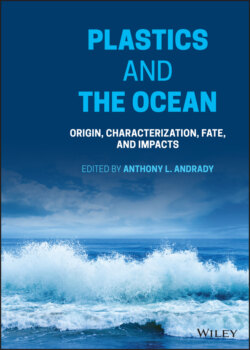Читать книгу Plastics and the Ocean - Группа авторов - Страница 2
Table of Contents
Оглавление1 Cover
2 Title Page
3 Copyright Page
4 Dedication
5 List of Contributors
6 Preface An Already Stressed Ocean Is it a Cause for Concern? How Much of a Threat do Plastics in the Ocean Pose?
7 Foreword
8 1 Plastics in the Anthropocene 1.1 What Are Plastics? 1.2 Plastics at Present and in the Future 1.3 Ingestion of Microplastics Marine Organisms 1.4 Sustainability of Plastics 1.5 Plastic Manufacturing 1.6 Polymers: A Basic Introduction 1.7 Societal Benefits of Plastics References
9 2 Plastic Additives in the Ocean 2.1 Function of Plastic Additive Classes 2.2 Functional Additives 2.3 Sources, Transport, and Fate of Additives in the Ocean 2.4 Degradation of Plastic Additives in the Marine Environment 2.5 Detection in the Marine Environment 2.6 Toxicity of Additives 2.7 NIST Disclaimer References
10 3 Deconstructing the Plastic Soup : 3.1 Introduction 3.2 Methods for Determining Plastic Pollution Sources 3.3 Discussion 3.4 Conclusions Acknowledgments References
11 4 Collection and Characterization of Microplastics Debris in Marine Ecosystems 4.1 Introduction 4.2 MP Sampling 4.3 Sample Processing 4.4 Characterization and Quantification 4.5 Summary and Outlook 4.6 Conclusions References
12 5 Estimating Microplastics in Deep Water 5.1 Introduction 5.2 Sampling Methods 5.3 Spatial Patterns of MPs in Water Columns 5.4 The Export of Microplastics from the Surface Water to the Deep Sea 5.5 Knowledge gaps and conclusion References
13 6 Marine Litter, Plastic, and Microplastics on the Seafloor 6.1 Introduction 6.2 Methods Used to Monitor Seafloor Litter 6.3 Sources 6.4 Oceanographic Conditions on the Seafloor 6.5 Accumulation Areas of Litter at the Seafloor 6.6 Importance of ALDFG 6.7 Nature and Distribution of Seafloor Litter 6.8 Microplastics 6.9 Impacts 6.10 Trends and Monitoring 6.11 Management Measures and Perspectives 6.12 Conclusions and Perspectives Acknowledgments References
14 7 Plastics in Freshwater Bodies 7.1 Introduction 7.2 Monitoring of Plastics in Freshwater Bodies 7.3 Global Observational Efforts 7.4 Modeling Plastics in Rivers and Lakes 7.5 Prospects and Opportunities References
15 8 Degradation and Fragmentation of Microplastics 8.1 Classifying Degradation 8.2 Weathering Under Laboratory Accelerated Conditions 8.3 Photo‐Oxidation Pathways of Common Plastics 8.4 Changes Accompanying Weathering of Plastics 8.5 Weathering of Plastics in the Marine Environment 8.6 Studies on Weathering of Plastics in Seawater 8.7 Fragmentation of Plastics in Marine Weathering 8.8 Conclusions References
16 9 Pollutants Sorbed Onto Microplastics 9.1 Introduction 9.2 Pollutants Sorbed by MPs 9.3 Influencing Factors 9.4 Sorption Kinetics and Isotherms 9.5 Sorption Mechanism 9.6 Conclusions References
17 10 Colonization of Plastic Marine Debris 10.1 Introduction 10.2 Preamble 10.3 The Known 10.4 The Unknown, but Knowable 10.5 The Unknowable 10.6 Conclusion References
18 11 Marine Biodegradation of Common Plastics 11.1 The Marine Environment 11.2 Rates of Biodegradation of Common Plastics 11.3 Plastics That Are Effectively Nonbiodegradable: Polyethylene, Polypropylene, and Polystyrene 11.4 Assessing Biodegradation and Mineralization 11.5 Standardized Tests to Assess Biodegradation References
19 12 Ingestion of Microplastics by Marine Animals 12.1 Introduction 12.2 Ingestion of Microplastics by Marine Organisms 12.3 The Impacts of Microplastic Ingestion on Marine Organisms 12.4 Impacts of Plastic‐Associated Chemicals on Organisms 12.5 Conclusion References
20 13 Microplastics in Fish and Seafood Species 13.1 Introduction 13.2 How Microplastics Can Enter Seafood and Transfer to Humans 13.3 Microplastics in the Seafood Supply Chain 13.4 Consequences of Microplastics in Seafood 13.5 Conclusion References
21 14 Nanoplastics and the Marine Environment 14.1 Introduction 14.2 Interactions Between Nanoplastics and Marine Microbiota 14.3 Impact of Nanoplastics on Marine Phototrophic Microorganisms 14.4 Impact of Nanoplastics on Marine Heterotrophic Microorganisms 14.5 Ecosystem Implications 14.6 Potential Effects of Nanoplastics on Humans 14.7 Outlook and Future Considerations References
22 15 Human Behavior and Marine Plastic Pollution 15.1 Introduction: Human Behavior and Marine Plastic Pollution 15.2 Human Behavior 15.3 Scoping Review of Behavior Change Interventions 2015–2020 15.4 Plastic Pollution and Behavior in the Global South 15.5 Research Gaps and Limitations 15.6 Remaining Challenges 15.7 Conclusion Acknowledgements References
23 16 Legal and Policy Frameworks for Preventing and Reducing Marine Plastic Pollution 16.1 Introduction to the Governance of Plastic Pollution 16.2 Overview of Legal and Policy Instruments 16.3 Regional Instruments 16.4 National Regulations and Policies 16.5 Conclusion References
24 Index
25 End User License Agreement
